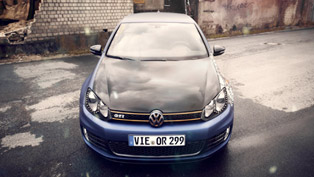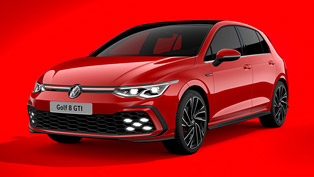Over 500 kg of recyclates in new Golf
Volkswagen commissioned an audit into the use of secondary raw materials known as recyclates in the new Golf. The investigation showed that 527 kg of secondary raw materials, or over 40 percent of the vehicle weight, are used in the new Golf, thus conserving resources. As a result, the new Golf not only excels with its efficient TSI and common rail engines, but also through the use of environmentally-friendly materials. This is the first time that an audit into the use of recyclates in a complete vehicle has been conducted and certified by the TÜV technical inspection authority.
The systematic use of recyclates at Volkswagen represents a careful and environmentally compatible approach to primary raw materials and reflects the capabilities of modern vehicle production. The metal life cycle is crucial to an overall ecological assessment of the vehicle. 501 kg of metal recyclates are used in the Golf, thus making an important contribution to conserving resources. Plastics account for 15 kg of the total recyclate weight, glass for 9 kg and operating fluids for 2 kg. TÜV NORD has certified these results. Some 5,000 parts were assessed during the audit.
Dr. Ulrich Hackenberg, Member of the Board of Management of the Volkswagen brand with responsibility for ‘Development', commented: "By taking effective recycling separation into account as early as the development stage, Volkswagen is making sure that end-of-life vehicles can also be returned to the material cycle." Dr. Harald Ludanek, Head of Total Vehicle Development and Protoypes at Volkswagen and also the Group's Vehicle Recycling Officer, added: "A prerequisite for the use of high-quality recyclates is that sufficient quantities are available for series production. Obviously, the recylcates must comply with the same high quality standards that Volkswagen sets for primary raw materials. The demanding specifications for surface quality and material durability referred to recyclates guarantee the safety, reliability and longevity of our vehicles."
Conserving primary resources and closing material cycles is an important goal for product development at Volkswagen. This is why the use of quality-assured recyclates in almost all vehicle parts is not only permitted, but proactively encouraged. Recyclates, which can replace primary materials and therefore contribute to the efficient use of resources, are obtained by treating production residue or from used materials.
Between 2000 and 2006, Volkswagen and its partner SiCon successfully developed the award-winning Volkswagen-SICON method for treating shredder residue from recycling end-of-life vehicles. This economically viable method has a proven recycling rate for present-day vehicles in excess of 85%. While metal recyclates are returned to the cycle in the form of new metal materials, granulated plastic waste, for example, is used as a reducing agent in blast furnaces.
















